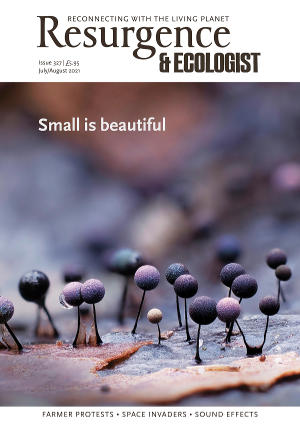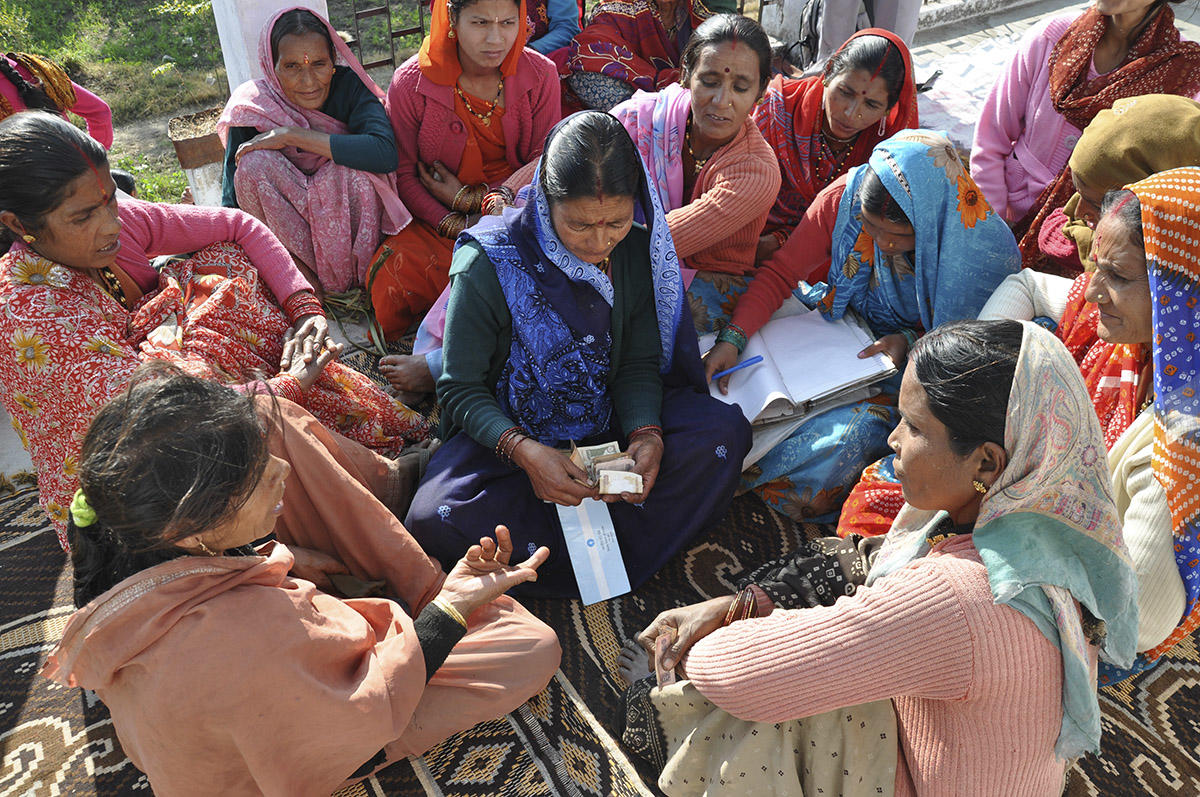It is a crisp winter morning in Naini, a small village overlooking the snow-clad Himalayas in the state of Uttarakhand in northern India. Everything works like clockwork at Mahila Umang Producers Company. In a small white cottage with a blue door, Radha weighs and packs chamomile in tea bags. In the adjoining cottage, Kala bottles honey. A little uphill, Shehnaz and Basanti peel mounds of kiwi fruits to be made into jam later. In the nearby Majkhali village, a small group of women sit in a circle and knit in a sun-filled courtyard.
In the last few decades, the Himalayan region has witnessed increasing deforestation, population growth, urbanisation, pollution and construction of dams, threatening its ecosystem, which is highly vulnerable to climate change. In 1992, Anita Paul and her husband Kalyan started the Pan Himalayan Grassroots Development Foundation, also called Grassroots, to work on sustainable development among the mountain community by promoting renewable energy, forestry and water conservation.
In the hills where everyone once grew indigenous crops on rain-fed terraces to nourish their families, the introduction of chemical agriculture, coupled with extreme climatic events, has led to smaller harvests. Frequent instances of human–wildlife conflict have also made farming an undesirable profession. Poverty, lack of jobs and absence of infrastructure such as hospitals and roads has forced many people from Uttarakhand to migrate to cities for work. It is mostly the men who leave, leaving the women in charge of the households and, in turn, doubling their workload.
In 2001, some women members of Grassroots decided to branch out into another organisation called Mahila Umang Samiti. Their focus was on creating livelihood opportunities for women. Eventually they registered themselves as Mahila Umang Producers Company, also known as Umang, in 2009.
Umang has a membership of 2,354 rural women from 161 self-help groups, which form its supply chain. Of these women, 38% are also shareholders of the company. The work done at Umang is rooted in the understanding that ecology, livelihoods and the lives of women are deeply intertwined. The self-help groups extend small loans to their members and provide them with income by sourcing organic food and knitwear from them.
As I travel along the winding road that connects the small town of Ranikhet to Naini, it is hard not to miss the House of Umang. On the ground floor of the white building are a food-processing facility and storage unit. Above is a spacious store selling indigenous food and fine handknit clothing. Behind the store lies the room where woollens are stocked and despatched to Indian fashion brands such as Fabindia and Jaypore. The company also sells its products online and through retailers in big Indian cities. It earned revenue of 16,397,900 rupees (£161,716) in 2019–20.
Apart from being producers, the women at Umang also work as “custodians of regenerated vegetation”, protecting trees they have planted in the past with Grassroots. The women monitor the growth of the trees, appoint guards to check forest fires, and ensure that cattle do not graze on the trees. They also preserve natural springs that provide drinking water by desilting them regularly.
Grassroots has also done significant work in the community to restore the basins of the Gagas and Palor rivers, which flow through the states of Uttarakhand and Himachal Pradesh respectively. “We planted more than a million trees and continue to plant 10,000 trees every year,” says Anita Paul, director of Community Initiatives at Grassroots and a board member at Umang.
Umang also promotes sustainable farming by encouraging women farmers to grow indigenous crops. The company produces spices, nuts, seeds, lentils and millet under its Himkhadya brand. Its other brand, Kumaoni, offers a variety of jams, chutneys, pickles and honey from the hills. Women farmers from Uttarakhand, Himachal Pradesh and Meghalaya supply the company.
At Umang’s spick and span food processing unit, five women separate ripe and unripe kiwi fruits brought in crates from the surrounding villages, put them in colourful tubs and wash and peel them. “Earlier I was just a daughter-in-law at home. By working here, I am able to make my own money and pay my expenses,” says Deepa Adhikari, who was previously a farmer. She found it hard to farm because wild monkeys ravaged her crops and now she prefers an indoor job. Her co-worker Hema Mehra points at her small gold earrings and says, “I was able to save money from this job and knitting and buy these for myself.”
India is a deeply patriarchal society in which women, especially those who are unmarried, widowed, separated or divorced, remain extremely vulnerable. They face social stigma, lack family support, and struggle to make ends meet. “From the beginning, Umang wanted to engage with single women,” says Sunita Kashyap, founder of Umang, as she walks down a narrow concrete path in Majkhali village to Geeta Mehta’s tailoring shop and residence. Geeta is a single woman and leads the women’s group in her village.
One after another, women from the neighbourhood stream into the courtyard in front of Geeta’s cottage. They sit on a rug with balls of yarn in front of them. “Knitting is convenient because I can work from home. I am able to pay for my children’s expenses with the money I make,” says Soni, who is knitting a black cardigan. The group goes beyond knitting together by extending micro-credit to members in need. The group lent 20,000 rupees (£200) to Soni’s sister-in-law Noor, who needed the money for her children’s schooling expenses and her husband’s medical treatment.
After the knitting circle is over, as Geeta hurries back into her shop to get back to stitching, she says, “If women don’t help each other, who else will?”







